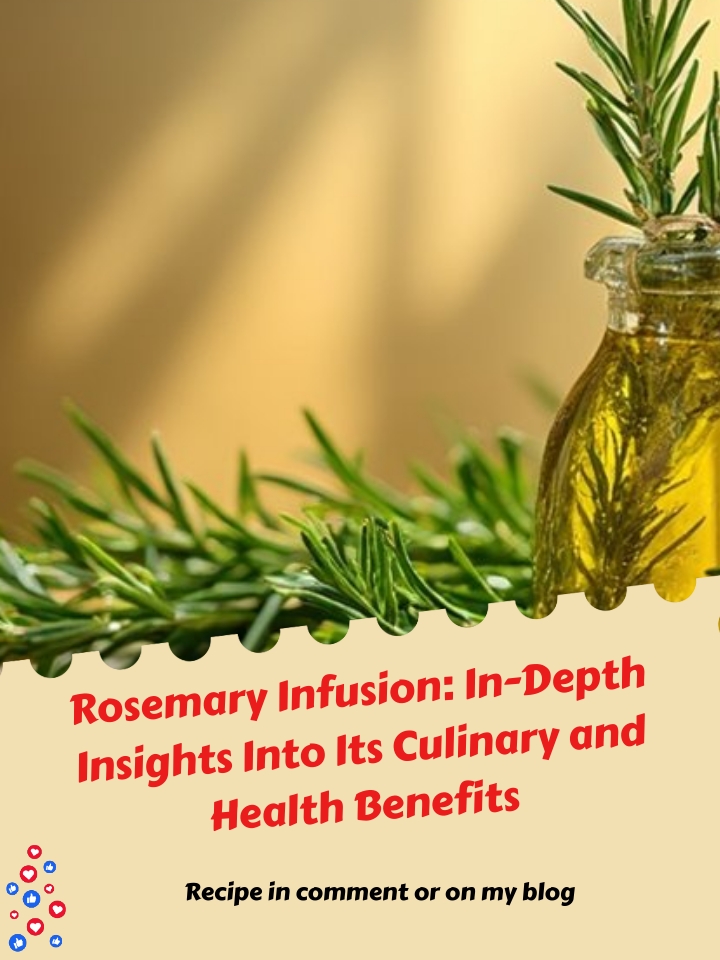
When you think of rosemary, you might picture its fragrant leaves enhancing your favorite dishes, but there's much more to this herb than meets the eye. You'll find that rosemary infusion not only enriches culinary experiences but also provides notable health benefits that might surprise you. From its historical significance in ancient cultures to its modern-day applications, rosemary offers a unique blend of flavor and wellness. Curious about how this simple infusion can elevate both your meals and your well-being? The details might just change how you view this common herb.
Key Takeaways
- Rosemary infusion is rich in vitamins A and C, offering significant immune support and promoting healthy skin and vision.
- It provides essential minerals like iron and calcium, contributing to overall health and wellness.
- Rosemary's antioxidant properties can improve digestion and alleviate discomfort after meals, enhancing overall digestive health.
- In culinary applications, rosemary infusion enhances flavors in oils, vinegars, and herbal teas, making it a versatile ingredient in Mediterranean cuisine.
- Caution is advised for pregnant women and those on certain medications, as rosemary can interact with blood thinners and other treatments.
Overview of Rosemary's Origins

Although rosemary's history stretches back thousands of years, its origins are firmly rooted in the Mediterranean region, where it thrives in warm climates. Can you envision a time when people first discovered this wonderful herb? It's fascinating!
The earliest mention of rosemary dates back to cuneiform stone tablets around 5000 BCE. Ancient Egyptians even used it in burial rituals, while the Greeks and Romans enjoyed it for cooking and medicinal purposes.
During the Middle Ages, the Spanish cultivated it as a tasty condiment for salted meats. Isn't it cool that it made its way to England thanks to the Countess of Hainault, who sent cuttings to Queen Philippa in the 14th century? Rosemary's medicinal uses also contributed to its popularity throughout history, as it was often linked to various ailments.
From there, it spread globally, traveling to South America with early settlers in the 17th century.
Rosemary's journey is a perfect example of how plants can connect cultures across time and space. You might feel a sense of nostalgia when you smell rosemary, as it's not just a herb; it's a piece of history!
Common names and scientific name
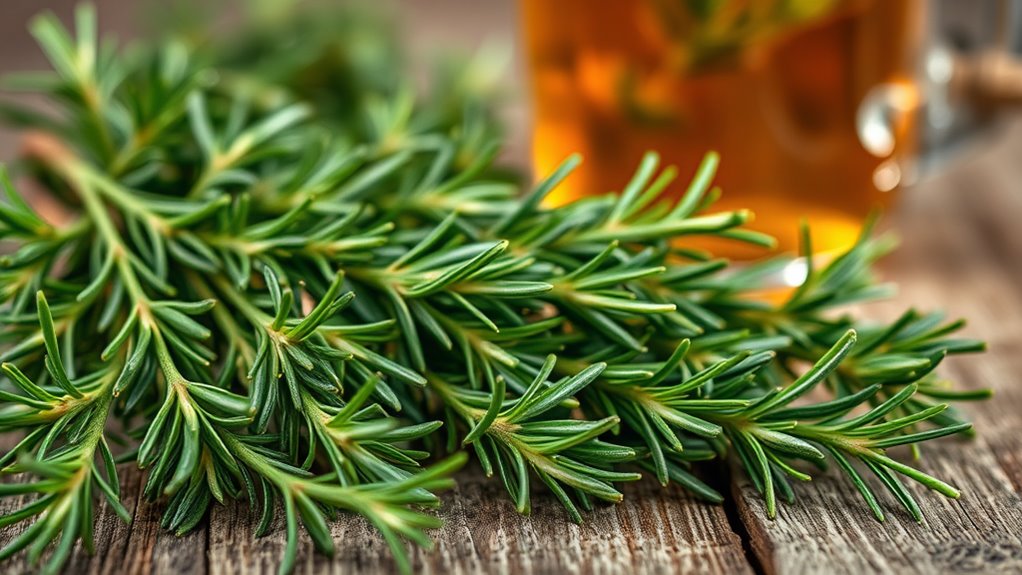
As you explore the rich history of rosemary, it's fascinating to observe its various names across different cultures. You might know it as rosemary, but did you know it's also called "Dew of the Sea"?
In French, it's "romarin," while in Spanish, folks call it "romero." Italians refer to it as "romarino," and in German and Swedish, it's "rosmarin." These names show how beloved this herb is worldwide!
Scientifically, rosemary is known as *Salvia rosmarinus*, though you might stumble upon its old name, *Rosmarinus officinalis*. It belongs to the Lamiaceae family, which means it's related to mint!
The name "rosemary" actually comes from Latin, meaning "dew of the sea." How poetic is that?
This aromatic herb isn't just a pretty face; it's been around for thousands of years. Ancient Egyptians used it in burial rituals, and famous people, like Pliny the Elder, wrote about it. Additionally, rosemary thrives in full sun, making it an excellent choice for gardens worldwide.
Culinary Rituals in Ancient Rome

In ancient Rome, culinary rituals were deeply intertwined with the use of herbs, transforming simple meals into flavorful experiences. Envision a bustling Roman kitchen, where herbs like rosemary, thyme, and basil danced in the air, adding excitement to every dish! You'd find olive oil pouring over roasted vegetables or a sprinkle of oregano making a savory sauce sing.
Herbs weren't just for flavor; they were believed to have magical powers for health too. Each meal was an adventure, with garum, a fermented fish sauce, giving dishes an extra zing. Honey sweetened desserts, while parsley brightened up the plate, making everything look just as good as it tasted. Silphium was particularly cherished and used as a cure-all herb, showcasing the Romans' deep appreciation for the medicinal properties of their ingredients. The use of herbs like rosemary not only added flavor but also brought with it health benefits that the Romans valued highly.
As the Romans cooked, they shared stories and laughter, creating memories with every meal. You might even find them using thyme, not just for its taste but because they thought it could keep them healthy—talk about multitasking!
While some herbs faded away over time, like the famous Silphium, many still find a place in modern Roman kitchens. So, the next time you sprinkle some rosemary on your dinner, remember you're part of a rich history that's been cooking for centuries!
Botanical classification

Rosemary's botanical classification reveals its fascinating journey through the plant kingdom. You might be surprised to learn that this beloved herb belongs to the kingdom Plantae.
It's part of the Magnoliophyta division, which is just a fancy way of saying it's an angiosperm, or flowering plant. Rosemary fits snugly into the Lamiaceae family, which includes a variety of other herbs like mint and basil.
Originally classified as Rosmarinus officinalis, rosemary got a makeover in 2017 and is now called Salvia rosmarinus. This change happened when scientists reevaluated the genus Salvia, deciding to include rosemary. It's like when you get a new nickname that's even cooler than your old one!
Fun fact: the name "rosemary" comes from Latin, meaning "dew of the sea." It's an apt name, considering how fresh and vibrant this herb is! Additionally, rosemary can thrive in drought-resistant environments, making it a resilient choice for gardens.
You might also come across its relatives, like Salvia jordanii, which was once known as Rosmarinus eriocalyx.
Physical characteristics

When you encounter rosemary, its physical characteristics immediately stand out. You'll notice its leaves, which are long and narrow, almost like tiny pine needles. They're about 1 to 4 centimeters long and have a deep green color on top, while the underside is a soft white. If you take a closer look, you'll see the leaves are shiny above and fuzzy below. This unique texture makes them feel special, don't you think?
Now, let's talk about the stem. Rosemary grows as a woody shrub, branching out as it reaches heights of 1 to 2 meters, with some varieties even taller. It's like a little green tree!
During late spring to early summer, you might spot its lovely flowers, which can be blue, purple, pink, or white. They're small but charming, appearing in clusters on the branches.
And let's not forget about its delightful aroma! When you crush a leaf, the smell is simply amazing, reminding you of grandma's kitchen. This aromatic quality is due to its essential oil content, which ranges from 0.3% to 2%, primarily borneol.
With its drought tolerance and robust root system, rosemary isn't just pretty; it's a tough little plant that can thrive in many conditions!
Growing conditions and habitat

To grow healthy rosemary, you need to provide the right conditions that mimic its natural habitat. This aromatic herb loves warmth and sunshine, so let's make sure you create a cozy environment for it!
- Temperature: Aim for 55 to 80 degrees. Rosemary hates the cold and can't survive below freezing.
- Soil: Use well-draining, slightly acidic to neutral soil. A pH between 6.0 and 7.0 is just perfect! Additionally, avoid overly wet conditions to prevent root rot.
- Sunlight: Give it at least 6 hours of direct sunlight daily. If you're growing indoors, a south-facing window works wonders.
- Watering: Keep the soil on the dry side. Check it often, and only water when the top inch feels dry.
- Humidity: Rosemary prefers low humidity. Too much moisture can lead to rot, and we wouldn't want that!
Think of rosemary as your herb buddy. It wants a warm, sunny spot to thrive, just like you do on a beautiful summer day.
With the right conditions, you'll have a lovely rosemary plant that'll keep your kitchen smelling amazing! Happy growing!
Key nutrients (vitamins, minerals)

Packed with essential vitamins and minerals, rosemary is a powerhouse of nutrition that can enhance your overall health. This aromatic herb isn't just for flavoring your favorite dishes; it's packed with goodies that your body loves!
For instance, just 100 grams of rosemary gives you nearly 97% of your daily need for vitamin A, which is great for your eyes and skin. Plus, it has vitamin C, which helps keep your immune system strong and helps heal cuts and scrapes.
But wait, there's more! Rosemary also boasts minerals like iron, which helps transport oxygen in your blood, and calcium, perfect for strong bones. Additionally, it contains significant minerals like magnesium and manganese that contribute to overall health.
And did you know it has potassium? This mineral helps regulate your heart rate.
Don't forget about fiber! Rosemary contains dietary fiber, which is fantastic for your digestion. It's even low in calories, so you can sprinkle it on without a worry.
With all these nutrients, rosemary can be your secret ingredient for better health. So, why not add some to your next meal? Trust me, your taste buds and your body will thank you!
Active compounds relevant to infusion
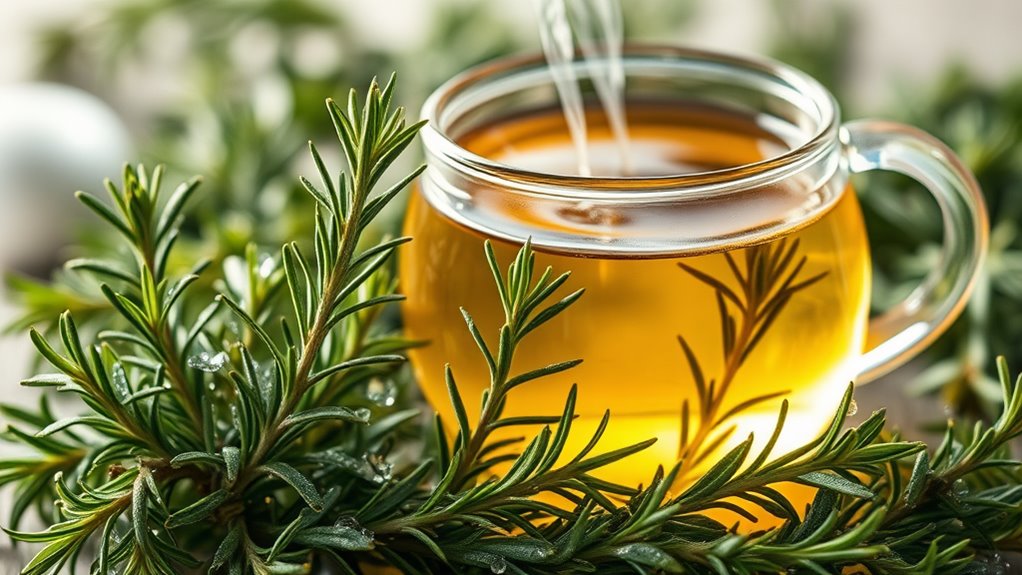
Rosemary infusion is rich in active compounds that offer numerous health benefits. When you sip on that aromatic brew, you're not just enjoying a tasty drink; you're also getting a boost from some powerful ingredients.
Let's explore some of the key players:
- Carnosic Acid: This little gem packs a punch with high antioxidant activity.
- Rosmarinic Acid: Known for its antioxidant and anti-inflammatory effects, it's like a superhero for your health. The infusion also provides anti-inflammatory properties from other herbs like sage.
- Flavonoids: Compounds like luteolin help fight off inflammation and germs. Who knew tea could be so tough?
- Essential Oils: Ingredients such as 1,8-cineole and linalool make your infusion aromatic and therapeutic.
- Carnosol: Similar to carnosic acid, it adds to the overall antioxidant goodness of rosemary.
Notably, rosemary infusion is also known for its ability to enhance oxidative stability in various food products, making it a valuable addition beyond just a beverage.
When you enjoy a rosemary infusion, you're not just treating your taste buds; you're also giving your body some love.
Overview of health benefits when used as an infusion

When you brew a rosemary infusion, you're tapping into a wide array of health benefits that extend beyond its delightful flavor. This aromatic tea isn't just a treat for your taste buds; it's like a little hug for your gut! Drinking rosemary tea can help improve digestion by stimulating those important digestive enzymes. Plus, it might help with gas and bloating, making you feel lighter and more comfortable.
But that's not all! Rosemary is packed with antioxidants that fight off oxidative stress, which is just a fancy way of saying it helps keep your cells happy and healthy. If you're feeling stressed or anxious, sipping on rosemary tea can be a calming experience. You might even find it helps you concentrate better—perfect for those long study sessions or workdays! Additionally, the mild calming effects of rosemary tea may help alleviate stress and anxiety, making it a wonderful addition to your routine. Drinking rosemary tea can also enhance your overall well-being through its antioxidant properties.
And let's not forget about your immune system. Rosemary tea is rich in vitamin C and has antimicrobial properties, giving your body a nice boost when it needs it most.
Detoxification Benefits

Detoxification is essential for maintaining your overall health, and rosemary tea plays a significant role in this process. Drinking this fragrant infusion helps clear out toxins from your body, making you feel lighter and more energetic.
It's like giving your liver a little spa day!
Here are some fantastic detox benefits of rosemary tea:
- Boosts liver function by flushing out harmful toxins.
- Acts as a natural diuretic, helping you eliminate extra fluid and toxins.
- Packed with antioxidants, which fight against oxidative stress and support immune health.
- Promotes digestive health, aiding in the breakdown of food and nutrient absorption.
- Supports kidney health by reducing the risk of kidney stones.
Imagine sipping on a warm cup of rosemary tea, feeling the soothing aroma wash over you. Additionally, it supports liver function by regulating hepatic lipid metabolism.
It's not just a drink; it's a tool for better health!
So, the next time you need a little detox, reach for rosemary tea. Your body will thank you, and who knows, you might even feel like a superhero after!
Cheers to feeling great and reaping the benefits of this delightful infusion!
Specific conditions or symptoms alleviated by the infusion

The soothing properties of rosemary infusion can provide relief for various conditions and symptoms you might encounter. If you've ever felt bloated after a big meal, this herbal drink can help ease that discomfort. It works wonders for your digestion, making those heavy meals feel a lot lighter on your stomach. Additionally, rosemary is known for its ability to improve digestion, enhancing your overall digestive health. Furthermore, the infusion can stimulate immune system health, making it a great choice when you're feeling unwell.
Plus, if indigestion strikes, a warm cup of rosemary infusion could be just what you need.
But wait, there's more! If you're dealing with joint or muscle pain, rosemary's anti-inflammatory powers come to the rescue. It can soothe aches and even help with conditions like gout and sciatica.
And don't forget about those pesky headaches that pop up after indulging a little too much; rosemary infusion can help there, too!
Feeling a bit under the weather? This infusion doesn't just stop at physical symptoms. It's known to boost your immune system and can even clear your sinuses.
Clinical Trials on Infusion Effects

Exploring the effects of rosemary infusion through clinical trials reveals promising insights into its health benefits. Researchers have conducted various studies, both on animals and humans, to see how rosemary can help us. They focused on areas like cognitive function, neuroprotection, and even inflammation.
Different forms of rosemary were tested, including extracts, essential oils, and good old tea!
Here are some exciting findings from these trials:
- Cognitive Boost: Rosemary extract improved learning and memory in rat models.
- Neuroprotection: It showed the ability to reduce oxidative stress in the brain, which is crucial given that neurological disorders lead to functional or structural damage to the nervous system.
- Mood Lifter: Drinking rosemary tea helped reduce anxiety and depression in mice.
- Heart Health: Rosemary leaves powder lowered cholesterol levels, which is great for your heart.
- Skin Saver: Its carnosic acid protects against UV damage, keeping skin healthy.
These trials used various methods and groups, helping scientists compare results effectively. As we learn more about rosemary's benefits, it might just become your new favorite herb!
Who knew a little infusion could pack such a punch?
Key research findings
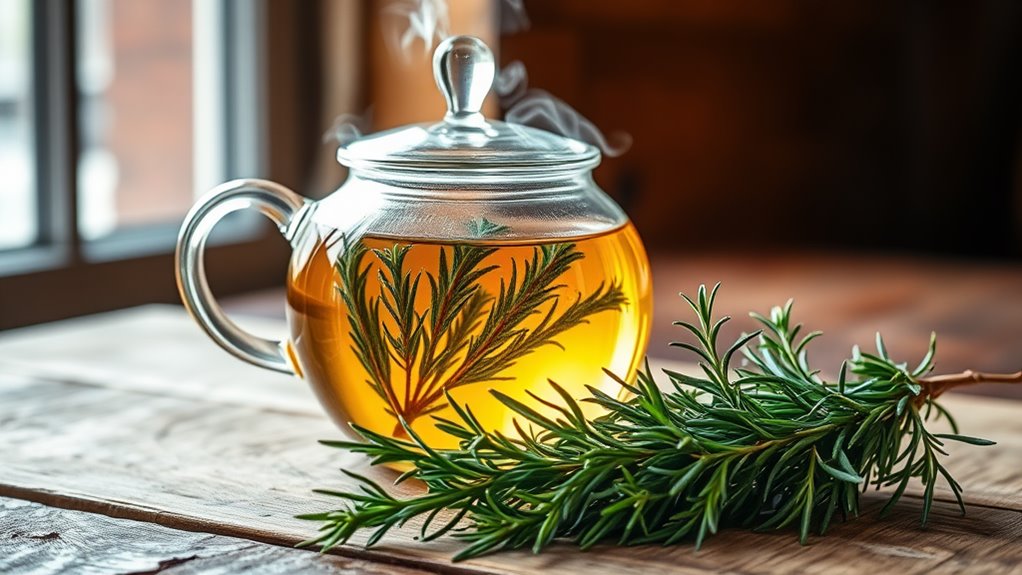
Many studies have highlighted the impressive benefits of rosemary infusion, showcasing its potential across various health domains. You might be surprised to learn that this fragrant herb does more than just spice up your roasted chicken!
Rosemary can enhance the flavors of your favorite dishes, like roasted veggies and even desserts. Envision a piece of lemon cake with a hint of rosemary—delicious, right?
On the health side, rosemary infusion is a digestive superhero. It can help ease bloating and an upset stomach, making it a great option after a big meal. Plus, it's got antiseptic and detoxifying properties, which means it helps your body flush out toxins.
Feeling a bit achy? Rosemary is known for its anti-inflammatory effects, making it a natural choice for soothing muscle pain. It even helps with circulation, so you won't have cold hands and feet anymore. Furthermore, its rich content of iron and vitamins contributes to overall health and well-being.
And let's not forget about your brain! Rosemary may boost memory and alertness, perfect for those days when you need to concentrate.
How to prepare the herb for infusion (fresh vs. dried)
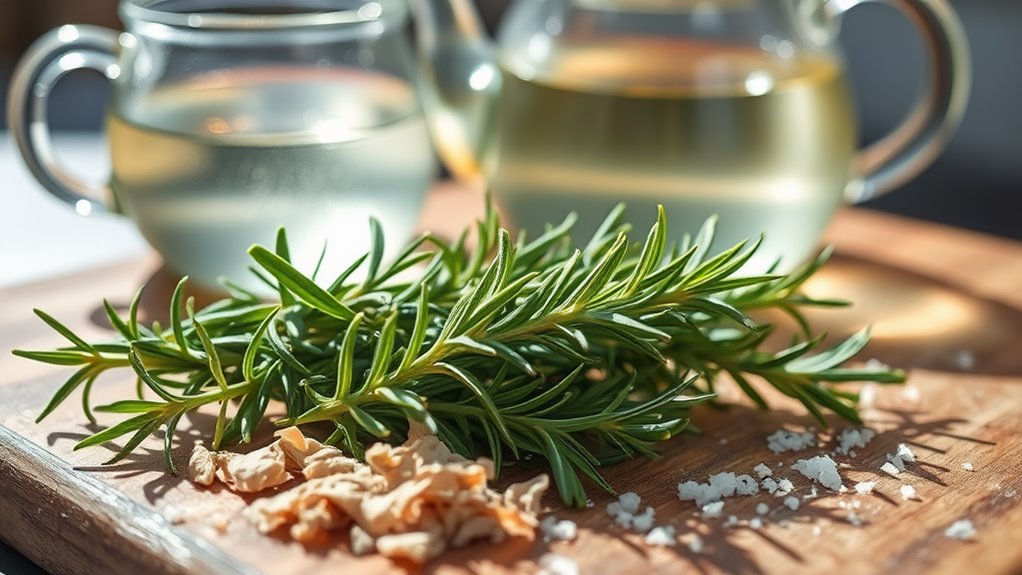
When preparing rosemary for infusion, choosing between fresh and dried forms can greatly affect the flavor and health benefits of your brew. Fresh rosemary is usually the star of the show because it has more oils and a brighter taste. But dried rosemary can still do the trick if fresh isn't on hand.
Here's how to get the most out of your rosemary, whether it's fresh or dried:
- Rinse fresh rosemary under cold water to clean it off.
- Remove the leaves from the stems for a better infusion, or use whole sprigs and strain later.
- For fresh rosemary tea, use 1-2 sprigs per 2 cups of water. Additionally, its antioxidant properties can enhance your overall health when infused properly. The infusion can also support immune system function due to the health benefits of rosemary.
Dried rosemary can be rehydrated by soaking it in hot water before use.
Store dried rosemary in a cool, dark place to keep it fresh longer.
Recommended proportions for infusion preparation
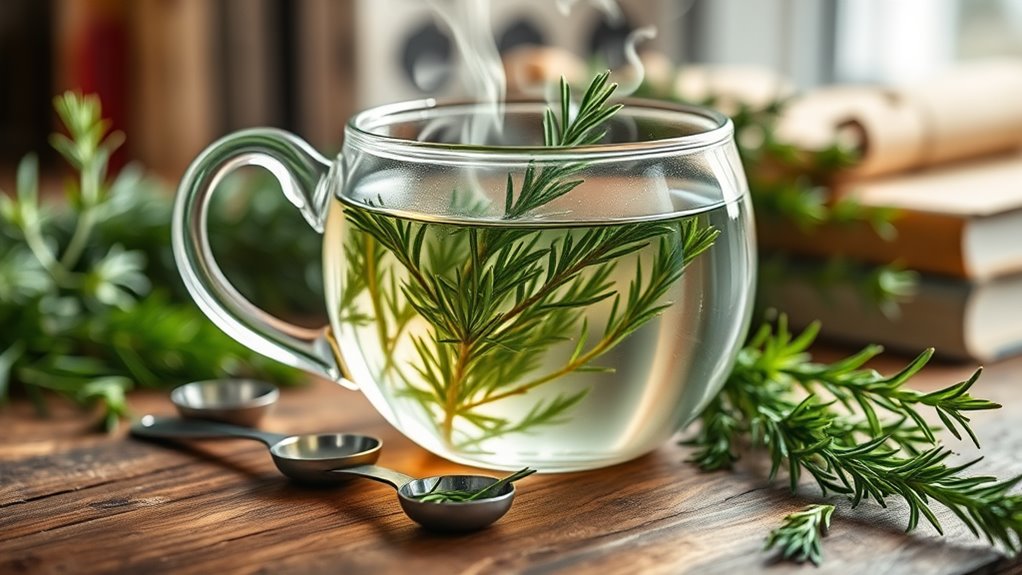
Finding the right proportions for rosemary infusion is essential for maximizing flavor and health benefits.
If you're using fresh rosemary, a good starting point is 1/2 cup of fresh rosemary leaves for every quart of boiling water. That'll give you a nice, strong flavor. For smaller batches, try 1 cup of water with 2-3 sprigs of rosemary or just a single sprig for 2 cups of water.
Now, if you're working with dried rosemary, you'll want to use less. For a quart of boiling water, stick to 1/4 cup of dried rosemary. A tablespoon of dried rosemary in 1 cup of water will also do the trick nicely. Remember, dried herbs pack a punch, so go easy on them! More herb and longer steeping time increase the medicinal properties of your infusion.
Feel free to get creative! Adding fresh ginger or a cinnamon stick can spice things up, and a splash of lemon juice can brighten the flavor.
If you're feeling adventurous, toss in some mint for an invigorating twist. Just remember to strain the herbs out before sipping your delicious infusion. Enjoy every sip!
Steeping methods and times for optimal infusion
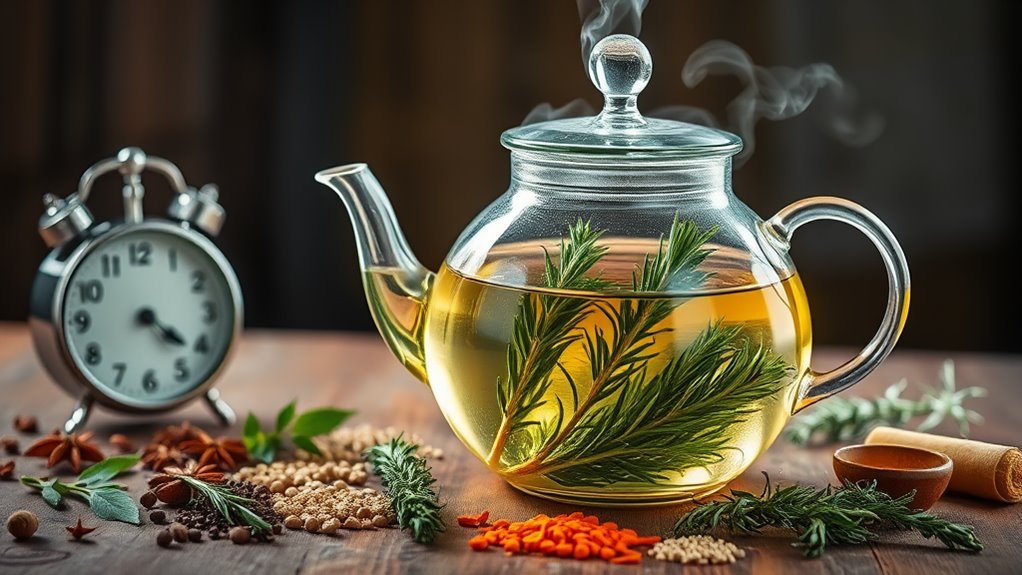
Steeping rosemary properly is key to extracting its full flavor and health benefits. You want to make sure you get it just right, or your tea might end up tasting like a pine tree!
Here are some tips to help you steep rosemary like a pro:
- Boiling Water: Always use boiling water, around 200-212°F, to kickstart the infusion.
- Steeping Time: Aim for 5 to 10 minutes. Too short, and you'll miss out; too long, and it might be too strong.
- Fresh vs. Dried: Fresh rosemary gives a vibrant flavor, while dried rosemary packs a concentrated punch. Choose what you prefer! Dried rosemary is best for long-term storage.
- Strain It: Use a tea strainer to separate the leaves from your delicious brew.
- Experiment: Don't be shy! Try adding ginger, lemon, or mint for an extra twist.
Herbal Syrups and Extracts
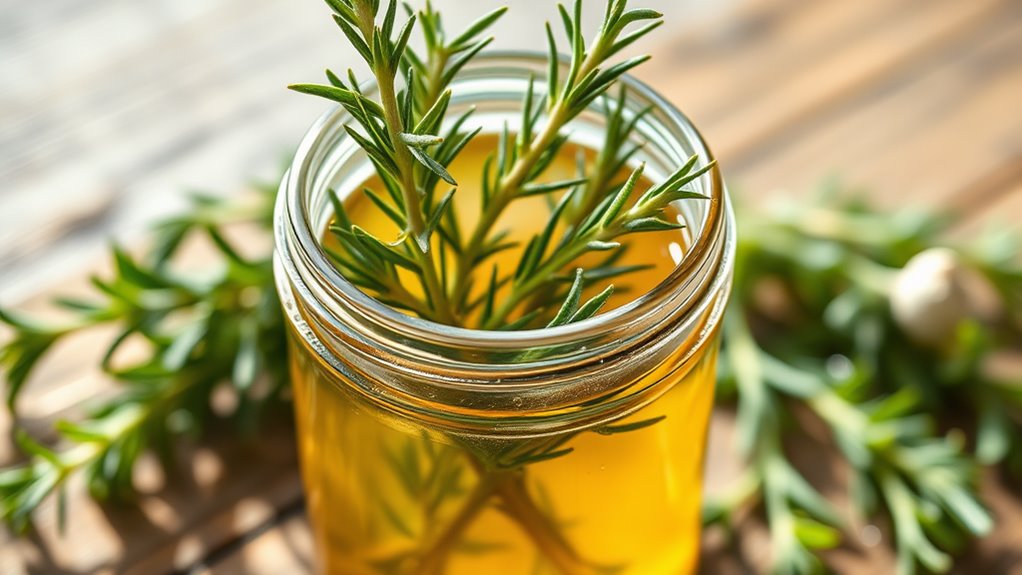
Herbal syrups and extracts offer a versatile way to enjoy the benefits of rosemary in your daily routine. You can easily whip up rosemary-infused oils to add flavor to your dishes or use them topically for muscle aches. Envision soothing your sore spots with a natural remedy instead of reaching for pain relievers!
Want to improve your digestion? Rosemary extracts can help relieve bloating and gas. It's like giving your tummy a gentle hug! Additionally, these extracts exhibit antibiotic properties that can help combat harmful bacteria in your gut.
Plus, if you're looking for a natural hair treatment, rosemary's got you covered. It can promote hair growth and fight dandruff, leaving your hair looking fabulous.
Don't forget about aromatherapy! Just a few drops of rosemary extract can boost your memory and reduce stress—perfect for those busy days.
And if you're into skin care, rosemary's astringent properties can help tone your skin, making you feel refreshed.
Flavor characteristics relevant to infusion
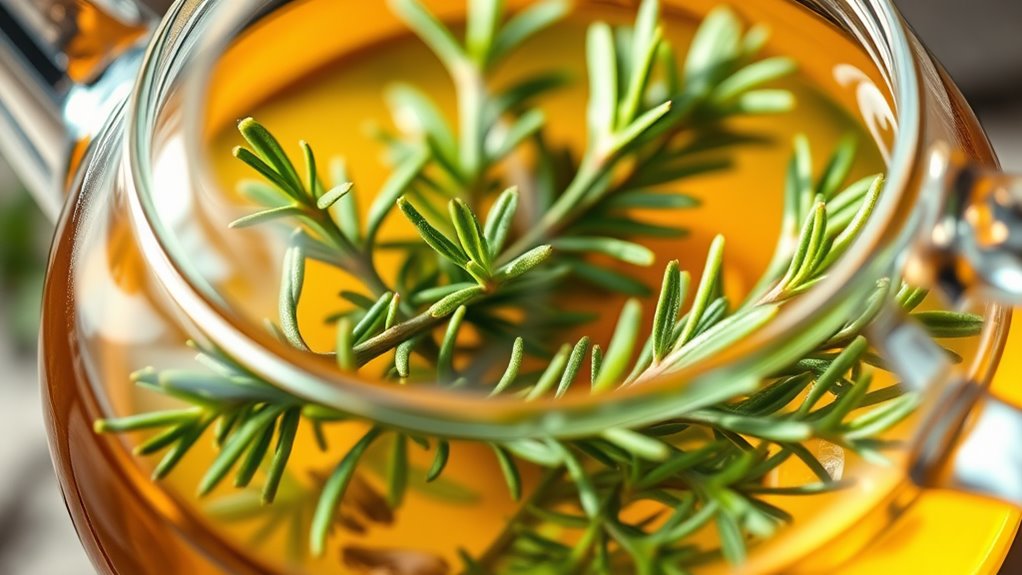
When you infuse rosemary, you'll discover a flavor profile that's both bold and complex. It's like giving your taste buds a little adventure!
You'll notice strong pine notes, along with hints of lemon and mint. The infusion has a slightly minty, sage-like flavor too, with a peppery kick and a woody aftertaste.
Here are some key flavor characteristics to keep in mind:
- Piney and Woody: A strong, earthy essence that fills the room.
- Minty and Sage-like: Adds freshness with a herbal twist.
- Variety-Specific: Different rosemary types, like Tuscan Blue, can surprise you with their unique flavors.
- Herbal and Green: Captures the essence of fresh herbs, which are often preferred for cooking.
- Complex and Fresh: It enhances dishes and drinks, making them come alive!
Infused Rosemary Lemonade Recipes

Revamping your lemonade routine with infused rosemary can elevate your refreshment game to a whole new level. Envision sipping a cool glass of rosemary lemonade on a sunny day.
To start, steep 1-2 sprigs of rosemary in boiling water for about 5-10 minutes. This is where the magic begins! After steeping, add fresh lemon juice or slices to brighten the flavor, and sweeten it up with honey or agave syrup. Drinking rosemary tea can provide a comforting experience that complements the refreshing lemonade. This infusion not only enhances the taste but also incorporates the health benefits of rosemary and lemon into your drink.
If you want to take it up a notch, try adding sliced ginger for a zingy twist, or toss in some fresh mint leaves for a revitalizing kick. Feeling adventurous? Add a cinnamon stick or a few whole cloves for a cozy vibe.
Chill your rosemary tea in the refrigerator, and you've got a delightful drink ready to impress your friends.
Don't forget, you can always make a double batch! That way, you'll have some left for later, perfect for iced tea. Just remember to filter out the rosemary leaves with a fine mesh strainer, so you'll have a smooth, revitalizing drink. Cheers to a new favorite!
Potential side effects or contraindications
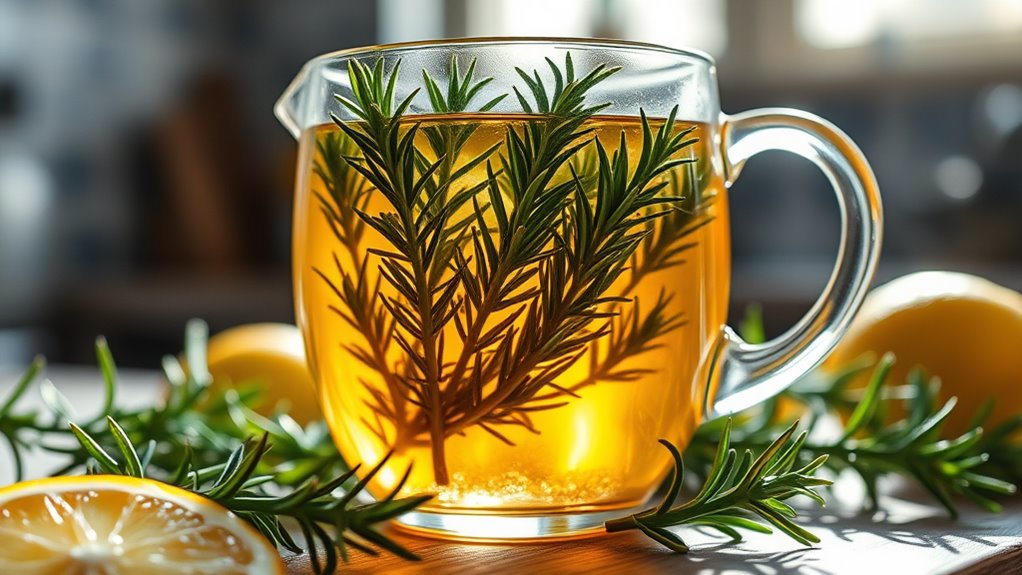
Although rosemary is celebrated for its flavor and potential health benefits, it's important to be aware of its possible side effects and contraindications. You might love adding rosemary to your dishes, but too much can lead to some unpleasant surprises.
Here are a few things to keep in mind:
- Eating large amounts can irritate your stomach and intestines.
- Excessive intake might even damage your kidneys.
- High doses can cause vomiting or, in rare cases, pulmonary edema.
- If you're allergic, you might experience skin reactions, especially from undiluted rosemary oil.
- Pregnant women should be cautious, as rosemary can stimulate menstrual flow and may even cause miscarriage. Additionally, large amounts of rosemary may lead to serious side effects such as confusion and slurred speech.
If you take medications, be sure to check with your doctor. Rosemary can interact with anticoagulants, diabetes meds, and more.
You wouldn't want to mix things up too much! So, enjoy your rosemary, but remember: moderation is key. A sprinkle here and there's perfect, but let's not go overboard!
Drug Absorption Alterations

Understanding how rosemary can alter drug absorption is essential for anyone considering its use alongside medications. If you love cooking with rosemary or sipping rosemary tea, you'll want to know how it interacts with your meds.
For starters, rosemary can slow blood sugar absorption. If you're taking diabetes medications, it might just drop your blood sugar too low, like forgetting to eat after a workout!
It also messes with some blood thinners. If you're on aspirin or warfarin, mixing in rosemary could increase the chances of bruising and bleeding. Yikes!
Plus, it might change how quickly your liver breaks down certain drugs, which can lead to unexpected effects. Additionally, rosemary's antioxidant properties may also play a role in influencing the metabolism of certain medications.
But that's not all! Rosemary's properties can also interfere with how your body absorbs glucose. So, if you're watching your sugar levels, you should keep a close eye on those numbers.
Culinary Infusions in Mediterranean Cultures
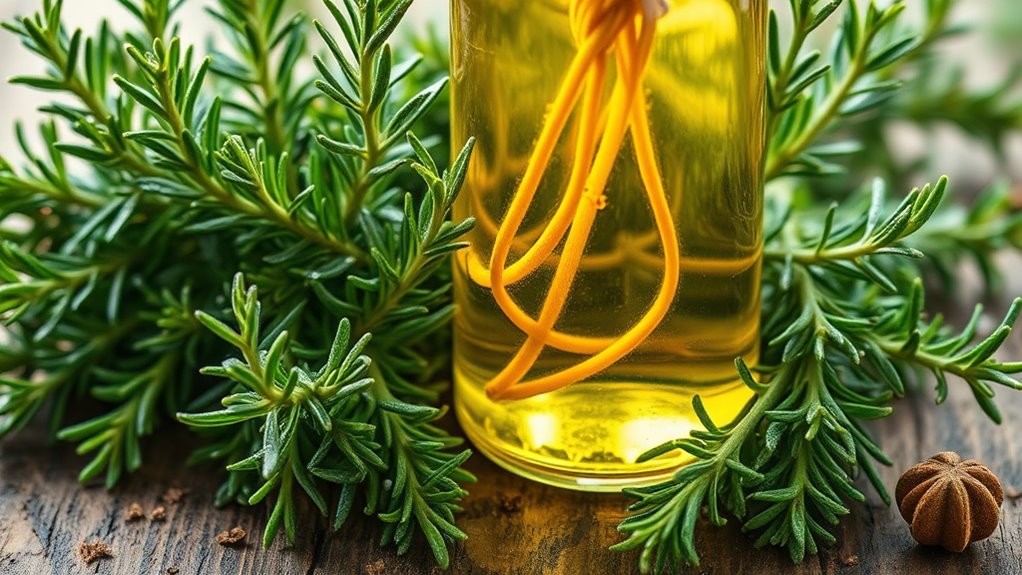
Mediterranean cultures have long celebrated the vibrant flavors and health benefits of culinary infusions, particularly with herbs like rosemary.
You can almost smell the fragrant herbs wafting through the air when you think of this delicious cuisine! Ancient Egyptians used rosemary not just for cooking but also in mummification. Talk about multitasking!
Greeks and Romans took it further, using rosemary in cooking and creating aromatic oils. It's fascinating how history connects through flavors, isn't it? The Greek and Roman empires facilitated widespread exchange of culinary ideas, which helped popularize rosemary in various dishes. Rosemary's historical significance in rituals and cuisine showcases its importance across cultures.
Here are some tasty highlights of culinary infusions in Mediterranean cultures:
- Aromatic oils: Rosemary-infused oils add a delightful twist to dishes.
- Meat magic: Rosemary shines in meat dishes, enhancing their flavor.
- Preservation: Ancient techniques helped keep food fresh, thanks to herbs.
- Cultural exchanges: The Silk Road spread these tasty techniques across regions.
- Herbal medicines: Rosemary's medicinal uses influenced its culinary applications.
Rosemary's Association With Remembrance

Throughout history, rosemary has frequently been associated with remembrance and memorial practices. You might be surprised to learn that ancient Greek scholars wore rosemary in their hair, believing it helped them remember their studies. Talk about a stylish study aid!
In medieval times, Charlemagne insisted on having rosemary in his royal gardens, showing just how important this herb was.
And if you're a fan of Shakespeare, you'll find rosemary mentioned in his plays, emphasizing its cultural significance. Legend has it that the Virgin Mary once laid her cloak on rosemary, turning its flowers from white to blue—a beautiful story, right?
At funerals, a sprig of rosemary was often placed in the hands of the deceased, symbolizing that they'd never be forgotten. You might even see it at weddings, where brides wear it to symbolize love and loyalty. In New Zealand and Australia, people wear rosemary on ANZAC Day to honor those who've passed, as it is often worn on lapels as a sign of remembrance for soldiers.
Summary of Infusion Benefits
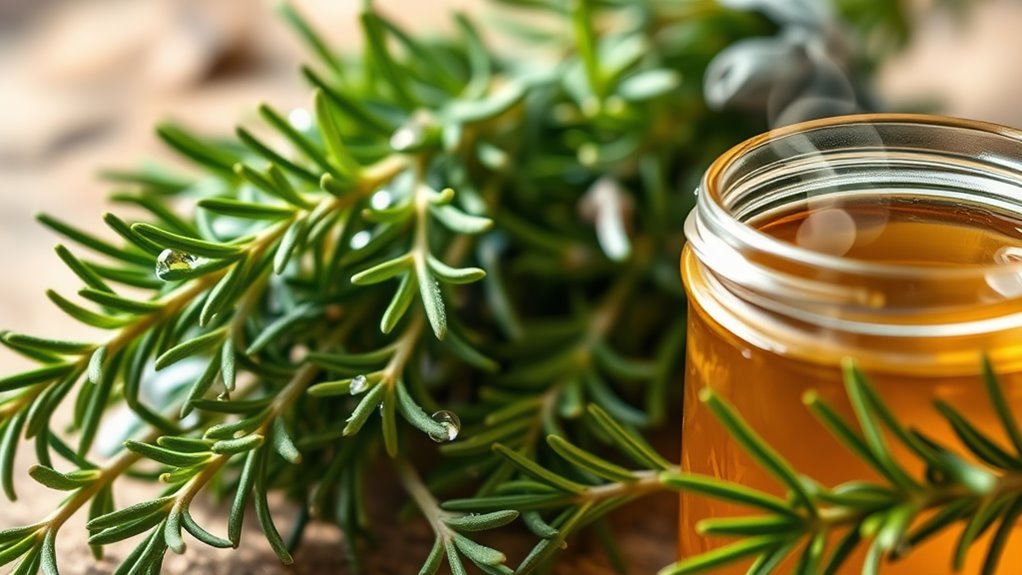
Rosemary isn't just a symbol of remembrance; it also offers a variety of benefits when infused. You'll find that this delightful herb can transform your meals and boost your health. Whether you're whipping up a cozy soup or roasting veggies, rosemary infusion adds a unique flavor. Plus, it's packed with nutrients that can help you feel better in no time!
Here are some great benefits of rosemary infusion:
- Enhances the flavor of rich, fatty foods and aids digestion.
- Pairs perfectly with roasted meats like chicken and lamb.
- Adds depth to your potatoes and veggies for a winning side dish.
- Works wonders in bread and focaccia recipes for a subtle herb kick. Additionally, olive oil infusion offers a rich profile that complements the aromatic qualities of rosemary.
- Helps alleviate gas and bloating while promoting hair growth. Additionally, rosemary is high in Manganese, which is essential for metabolic health.
The best part? It's easy to make! Just steep fresh rosemary leaves in hot water for a few minutes, and you're good to go.
Research on Rosemary Infusion Efficacy

Recent studies highlight the impressive efficacy of rosemary infusion in various health domains. You'll be excited to know that rosemary isn't just a tasty addition to your meals, but it also packs a powerful punch for your well-being!
For instance, researchers found that rosemary can boost memory and help with anxiety, making it a great companion for those stressful days. Envision sipping on a warm cup of rosemary tea while studying for exams or tackling a big project. Remarkably, long-term intake of rosemary may prevent thrombosis, adding to its array of health benefits.
But that's not all! Rosemary also shows promise in protecting your brain from damage and reducing oxidative stress, which is like giving your cells a superhero cape. It can even help with sleep quality, so you'll wake up feeling refreshed and ready to take on the world.
If you're worried about germs, rosemary infusion can come to the rescue too. It fights off bacteria and can help keep your food safe.
Frequently Asked Questions
How Does Rosemary Infusion Compare to Other Herbal Infusions?
When you compare rosemary infusion to other herbal infusions, you'll notice its unique antibacterial properties, enhanced circulation benefits, and nutritional content, making it especially versatile for culinary uses and specific health targets.
Can Rosemary Infusion Aid in Digestion?
Yes, rosemary infusion can aid digestion. It stimulates digestive enzymes, reduces bloating, and promotes healthy gut bacteria. Enjoy it after meals for relief from indigestion and to enhance nutrient absorption. Just drink in moderation!
What Are the Best Pairings for Rosemary Infusion in Cooking?
You can pair rosemary infusion with roasted meats like chicken and lamb, enhance vegetable dishes such as potatoes and mushrooms, and elevate dairy products like cheese and butter for a flavorful culinary experience.
Is Rosemary Infusion Safe for Pregnant Women?
Rosemary infusion isn't recommended for pregnant women due to potential risks like miscarriage and uterine contractions. Always consult your healthcare provider before consuming it to guarantee safety for you and your baby.
How Long Can I Store Rosemary Infusion?
You can store rosemary infusion in the refrigerator for about one to two weeks. If you freeze it, it lasts much longer, typically up to a year, maintaining its flavor and potency effectively.
Join Our Flavorful Journey!
Subscribe to our newsletter for exclusive updates, intriguing stories, and delicious new recipes crafted by our talented team.
Don't miss out! Sign up now and be the first to explore our latest creations and tips inspired by Keven's grandmother's wisdom.
Subscribe Today!





